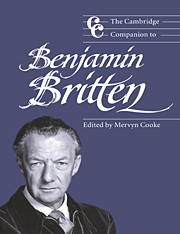3 - Britten in the cinema: Coal Face
from Part one - Apprenticeship
Published online by Cambridge University Press: 28 September 2011
Summary
During the 1930s under the visionary leadership of John Grierson, the film units of two government agencies, the Empire Marketing Board (EMB) and the General Post Office (GPO), produced documentary films of interest and quality – and occasionally of innovation. While the EMB's earliest films had been ‘silents’, the acquisition of sound-recording equipment by the GPO Film Unit led to some deliberate experimentation in the sound film, and striking results were achieved. Pett and Pott and The Song of Ceylon, both with music by Walter Leigh, are possibly the most fascinating examples of the GPO Film Unit's earliest consciously experimental sound films and evidently provided useful role-models for the youthful Britten when he arrived as a new member of Grierson's team in May 1935.
Although Britten was first engaged to write a through-composed twenty-minute score for The King's Stamp, a documentary tracing the history and production of postage stamps, he was soon seconded to a more challenging and controversial project: a social documentary examining the conditions prevailing at the time in the mining industry. While The King's Stamp possessed some experimental qualities, it can hardly be claimed they extend to its soundtrack or musical score – whatever their respective merits overall. Britten's next film score, however, shows a remarkable grasp of many experimental techniques; having demonstrated to his colleagues at the Unit what he could achieve in conventional circumstances, Britten was now chosen for Coal Face, from the outset a highly experimental production.
- Type
- Chapter
- Information
- The Cambridge Companion to Benjamin Britten , pp. 54 - 78Publisher: Cambridge University PressPrint publication year: 1999
- 1
- Cited by



